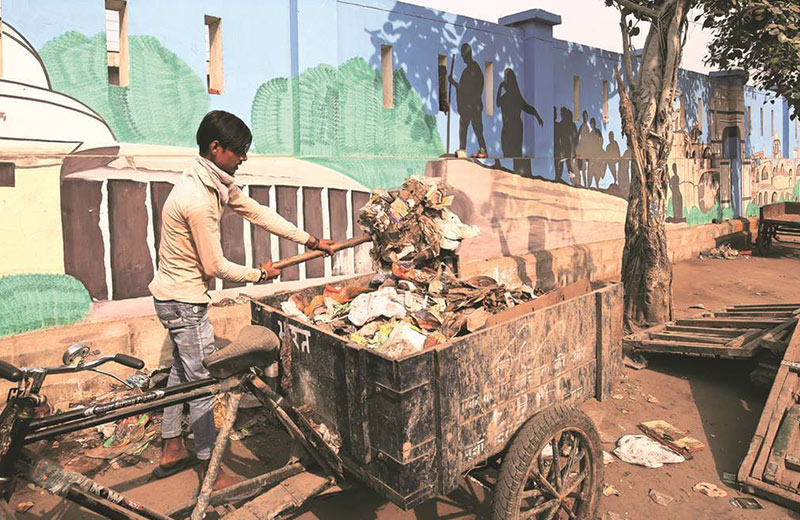Featured in THE INDIAN EXPRESS
The sanitation workers and waste collectors of Mumbai play a key role in keeping the maximum city clean and hygienic. But the role that these workers have been playing for decades to keep the financial capital moving is seldom acknowledged.
On Saturday evening, several dry waste collectors, sanitation workers, waste pickers and cleaners of public toilets came together at an independent seminar to share their experiences about how they earn their livelihood. The seminar was organised by the Indian Institute for Human Settlements (IIHS) and Alliance of Indian Waste Pickers (AIWP).
Besides the commonality of their profession, one common thread that binds these workers is that all of them have been deprived of the basic amenities offered by a decent livelihood. All of these workers are directly or indirectly employed with the Brihanmumbai Municipal Corporation (BMC), which is known as the richest civic body in Asia.
Suresh Naik, a septic tank cleaner who has been in this profession for more than a decade, says that every group of cleaners is paid Rs 3,000 each for cleaning a septic tank for housing societies and slums. Naik says that in one group, there are usually five to six people and all of them have to share that money.
“In many cases, we have to climb down the tank, which is filled with hazardous gas and biological waste. Despite this, we don’t get any medical insurance or health benefits. We are being paid on per day basis and if we fall sick and fail to report to work, our entire day’s wage gets deducted,” said Naik.
Sanjana Lavera, a transgender person who works as a toilet cleaner in Bhandup, says she doesn’t have anywhere to stay and therefore lives inside the public toilet itself. Lavera says she has been doing this work since she was 10 years old and she earns a meager Rs 4,000 per month.
“There are people who consider me untouchable and mock me. But I take immense pride in what I do, because I earn my bread through sheer hard work and honesty and I didn’t end up being a beggar or taking up an illicit way of earning a livelihood,” says Lavera.
She says her mother, who was in the same profession, lost her sight after muriatic acid damaged her eyes when she was cleaning a toilet.
While the workers spoke about how marginally paid and socially exploited they are, they acknowledged the fact that they take immense pride in what they do.
Ravi Kanan, a solid waste worker with the BMC, recalled the pandemic-induced lockdown, when they were on the ground even as the entire world stayed indoors.
“Just like the Army protects the border, I believe sanitation workers keep this city clean and prevent it from stopping. During the lockdown, when there was no transport available, we reported to work every day. On several occasions, we paid money from our own pocket for the transport fare, without thinking about reimbursement,” he said. Kanan is one of the workers who is directly employed with the BMC.
He says despite being a permanent employee of the civic body, he is deprived of basic facilities like medical insurance. “A few years ago, the BMC came up with a scheme of giving insurance to cleaners. They used to deduct the premiums from our salaries. But when I needed money for my treatment, I was not given any benefit. I had to take loan worth Rs 1.5 lakh, which I am still repaying,” Kanan adds.
Suresh Naik, a drainage cleaner with the civic Storm Water Department, said contractual workers don’t even get the wages that they are promised in the first place. “While cleaning drains and transferring garbage, we often get injured. But we don’t get any health benefits. Our jobs have so much stigma that even doctors hesitate to touch us. We are also not paid enough. If the tenders say that we will get Rs 700 per day, we get only Rs 300 or Rs 400,” Naik says.
Kanan said the BMC needs to bring contractual workers on its payroll now as the nature of work of permanent and contractual employees is the same but the latter get badly exploited by the contractors.
Ramkala Khandare, a waste segregator, says that their payment has been same for a long time while the prices of all basic amenities, such as gas cylinders and vegetables, are increasing everyday.
The session was moderated by independent journalist, columnist and author, Kalpana Sharma.



Leave A Comment
You must be logged in to post a comment.